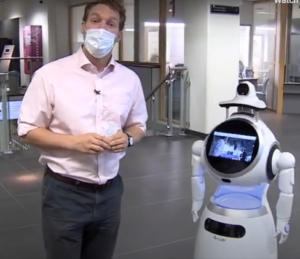

The rise of robots, automation and e-commerce in the post-pandemic world
 Advanced
Advanced
2020/08/04 18 :22
1. void (n)
a large hole or empty space
2. bots (n)
a computer program that works automatically, especially one that searches for and finds information on the internet
3. detrimental (adj)
causing harm or damage
4. inventory (n)
a detailed list of all the things in a place
5. turnstiles (n)
a device with waist-high horizontal bars that one person at a time can push around to enter a place, esp. a place that you pay to use
6. deployed (v)
to use something or someone, especially in an effective way
7. adapt (v)
to change your ideas or behaviour to make them suitable for a new situation
8. adoption (n)
accepting or starting to use something new
The rise of robots, automation and e-commerce in the post-pandemic world

As human interaction is kept to a minimum the world over, machines are increasingly being drafted in to fill the void. From China to Russia and the US, robots and automation are rapidly becoming an integral part to how some companies adapt to social distancing. With less humans on site, bots can be deployed for essential cleaning, shelf stocking and deliveries for businesses of all shapes and sizes.
“Tally’s a fully autonomous mobile robot that’s designed to really help retailers better take inventory within retail stores. The goal of Tally is to help ensure our product is always stocked in the right place and has the right price. So with COVID-19, we think there’s a stronger case now more than ever for automation and better data within retail. We think that will drive greater adoption of robotics.”
But could this acceleration towards robotics and automation have a detrimental impact on workers? Companies like Brain Corp insist that humans still have a place in the workforce.
“We’re not trying to replace a human, and the companies that generally do try to do that in robotics often fail, because humans are so flexible and can perform so many other tasks,” says the firm’s product vice president Phil Duffy
“We are an advanced tool that allows them to perform at a higher productive level that really enables them to focus on the higher value tasks that robots aren’t good at,” he adds.
Whatever one’s view, the coronavirus crisis only looks set to accelerate this drive towards automation. In Russia workplaces and bus shelters are having intelligent temperature checking turnstiles installed, and in China a 1.3 million square metre 5G-powered smart port can unload and store cargo automatically.
Resource: https://www.euronews.com/2020/05/21/the-rise-of-robots-automation-and-e-commerce-in-the-post-pandemic-world

- Could robots even be smarter than humans?
- What jobs do robots do now that humans used to do?
“The world of the future will be an even more demanding struggle against the limitations of our intelligence, not a comfortable hammock in which we can lie down to be waited upon by our robot slaves.”
Norbert Wiener
“You just can't differentiate between a robot and the very best of humans.”
Isaac Asimov


